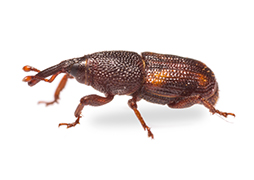
Bean Weevil Facts
- Scientific name: Chrysomelidae
- Size: 3.5 to 5mm
- Color: Black or brown
- Appearance: Compact oval-shaped, often with mottling or striped patterns
Bean Weevil Behavior
Weevils are a type of beetle but are distinguishable by their elongated snout. Some insects that are scientifically categorized as beetles bear the name of “weevils,” such as the bean weevil. Bean weevils are actually beetles, lacking the snouts of true weevils. Because bean weevils, also commonly called seed weevils, infest a variety of seeds and beans and actually belong to the family Chrysomelidae, which includes leaf beetles. Bean weevils are granivores and can live out their entire lives inside a single seed. There are over 1,350 species of bean weevils globally, including cowpea weevils.
Bean weevils thrive on all continents in the world with the exception of Antarctica. Probably originating in West Africa, according to historians, the majority of bean weevil populations spread throughout the world in legume shipments, while some were distributed by people moving dry stores of beans from place to place.
Bean Weevils Make Excellent Research Subjects
Considered model organisms because of their quick generation times and low maintenance, bean weevils are commonly used in research and education.
Bean Weevil Affects on Agriculture
Several species, considered agricultural pests in the US, destroy bean crops and some species even infest warehouse bean stores, making their way into household cupboards where they can contaminate food items.
Adult female bean weevils do not feed on beans but deposit their eggs on whole beans or seeds. Beans provide nutrition for developing larvae that eat their way into beans. When bean larvae pupate, they emerge through exit holes as adults.
- How to Get Rid of Weevils
- Infestation
- Health Concerns
4 Seasons Pest Control

Satisfaction Guarantee
What it includes*
-
Ants
-
Crickets
-
Fleas
-
Mice
-
All Roaches
-
Scorpions
-
Spiders
-
Ticks
-
Wasps
-
Other*
